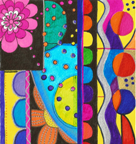Every counsellor/therapist starts from a philosophical standpoint – their views about the world which influence the way they work, their ethical decision-making, and the reason they became a counsellor. My own beliefs are most closely aligned with the humanistic perspective of counselling: I believe that we are all striving for something better, whether that is feeling better, living better, being healthier, wealthier, more accomplished. I believe that we all have needs in life that need to be met. And I believe that we can take personal responsibility for our lives and how we feel (this is not to say that people cannot be affected by circumstances – life always has something to throw at us!). When we experience stress, distress, or mental ill health such as depression or anxiety, I believe that, in many cases, it is because we have lost touch with ourselves in some way due to our experiences, and the way we think and feel about what has happened to us.
I say ‘on the whole’ because I do not deny the fact that human beings and the way we live is infinitely more complicated than that. We are affected by our genetics, biology, social environment, financial constraints, and upbringing, as well as our individual psychology. All these things help us to make us who we are, and we can feel like we have very little control at times. Counselling/therapy can help you to explore what you can control, and make changes based on this.
Humanistic practitioners view you as a whole person: your thoughts, feelings, experiences, and everything else I have just mentioned. Here is where I feel there can be an overlap with other approaches: I am seeing you as a unique individual. One person may wish to focus on their negative thought patterns, which is where I might bring in language and concepts from cognitive-behavioural therapy. Another person may wish to focus on their past, which can steer us towards conversations about attachment, which is a psychodynamic therapy concept. When I work with individuals to talk about their relationships, I draw on my understanding of systems theory, which takes account of the social circles in which we live and grow.
I don’t hide behind theory, or use theory as a way to tell you ‘what’s wrong’ with you. I use it to inform my empathy and understanding, and to help us to work together to explore how you feel and to find a way forward that feels right for you. Counselling is a partnership and a collaborative process, and you’re in the driving seat.
So, this is my philosophy and my approach. But above all the most important factor in therapy is the relationship between you and I. I use my counselling skills and training to make counselling a safe space where you feel able to share your thoughts, feelings and experiences with me, without fear of being judged. I’ve been told I’m a very calming person to be around, and I enjoy bringing my unique brand of humour into sessions (where it is appropriate of course!) – counselling is not just about exploring and coming to terms with sorrow, it is also about finding joy. Life is for living, after all, not just existing.


Pingback: What is Counselling? – Laura Hughes Therapies